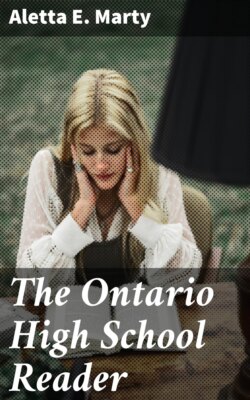Читать книгу The Ontario High School Reader - Aletta E. Marty - Страница 12
На сайте Литреса книга снята с продажи.
THE LEGEND BEAUTIFUL
ОглавлениеTable of Contents
From "Tales of a Wayside Inn"
"Hadst thou stayed, I must have fled!" That is what the Vision said.
In his chamber all alone, Kneeling on the floor of stone, Prayed the Monk in deep contrition5 For his sins of indecision, Prayed for greater self-denial In temptation and in trial; It was noonday by the dial, And the Monk was all alone.10
Suddenly, as if it lightened, An unwonted splendour brightened All within him and without him In that narrow cell of stone; And he saw the Blessed Vision15 Of our Lord, with light Elysian Like a vesture wrapped about Him, Like a garment round Him thrown. Not as crucified and slain, Not in agonies of pain,20 Not with bleeding hands and feet, Did the Monk his Master see; But as in the village street, In the house or harvest-field, Halt and lame and blind He healed,25 When He walked in Galilee.
In an attitude imploring, Hands upon his bosom crossed, Wondering, worshipping, adoring, Knelt the Monk in rapture lost.30 Lord, he thought, in heaven that reignest, Who am I, that thus Thou deignest To reveal Thyself to me? Who am I, that from the centre Of Thy glory Thou shouldst enter35 This poor cell, my guest to be?
Then amid his exaltation, Loud the convent bell appalling, From its belfry calling, calling, Rang through court and corridor40 With persistent iteration He had never heard before. It was now the appointed hour When alike in shine or shower, Winter's cold or summer's heat,45 To the convent portals came All the blind and halt and lame, All the beggars of the street, For their daily dole of food Dealt them by the brotherhood;50 And their almoner was he Who upon his bended knee, Rapt in silent ecstasy Of divinest self-surrender, Saw the Vision and the Splendour.55
Deep distress and hesitation Mingled with his adoration; Should he go or should he stay? Should he leave the poor to wait Hungry at the convent gate,60 Till the Vision passed away? Should he slight his radiant guest, Slight this visitant celestial, For a crowd of ragged, bestial Beggars at the convent gate?65 Would the Vision there remain? Would the Vision come again? Then a voice within his breast Whispered, audible and clear As if to the outward ear:70 "Do thy duty; that is best; Leave unto thy Lord the rest!"
Straightway to his feet he started, And with longing look intent On the Blessed Vision bent,75 Slowly from his cell departed, Slowly on his errand went.
At the gate the poor were waiting, Looking through the iron grating, With that terror in the eye80 That is only seen in those Who amid their wants and woes Hear the sound of doors that close, And of feet that pass them by; Grown familiar with disfavour,85 Grown familiar with the savour Of the bread by which men die! But to-day, they knew not why, Like the gate of Paradise Seemed the convent gate to rise,90 Like a sacrament divine Seemed to them the bread and wine. In his heart the Monk was praying, Thinking of the homeless poor, What they suffer and endure;95 What we see not, what we see; And the inward voice was saying: "Whatsoever thing thou doest To the least of Mine and lowest, That thou doest unto Me!"100
Unto Me! but had the Vision Come to him in beggar's clothing, Come a mendicant imploring, Would he then have knelt adoring, Or have listened with derision,105 And have turned away with loathing? Thus his conscience put the question, Full of troublesome suggestion, As at length, with hurried pace, Toward his cell he turned his face,110 And beheld the convent bright With a supernatural light, Like a luminous cloud expanding Over floor and wall and ceiling. But he paused with awestruck feeling115 At the threshold of his door, For the Vision still was standing As he left it there before, When the convent bell appalling, From its belfry calling, calling,120 Summoned him to feed the poor. Through the long hour intervening It had waited his return, And he felt his bosom burn, Comprehending all the meaning,125 When the Blessed Vision said, "Hadst thou stayed, I must have fled!"
—Henry Wadsworth Longfellow
Hadst, lightened, brightened, reignest, deignest, divinest. (Appendix, A, 3.)
ll. 29, 38–39, 78–79. (Appendix, A, 4.)
How can the reader show that the first two lines are merely introductory?
Divide the poem proper into five parts, giving to each part a suggestive title. How can the reader make each part stand out by itself? (Introduction, p. 10.)
Select the principal statement in each stanza and show how the voice may make it prominent. (Introduction, p. 33.)
What Inflection is placed on the principal statement? What Inflection on the subordinate phrases and clauses? (Introduction, p. 15.)
Select examples of momentary completeness from the poem.
ll. 19–22. What is the Inflection on these negative phrases? (Introduction, pp. 17 and 18.)
What is the Inflection on the various questions throughout the poem? (Introduction, p. 18.)
